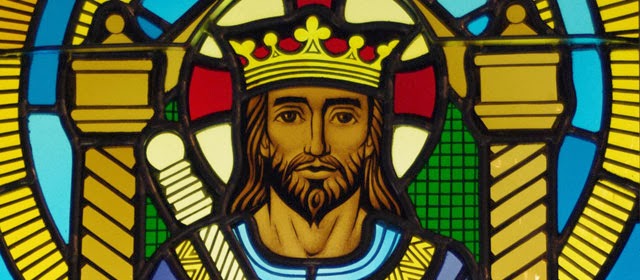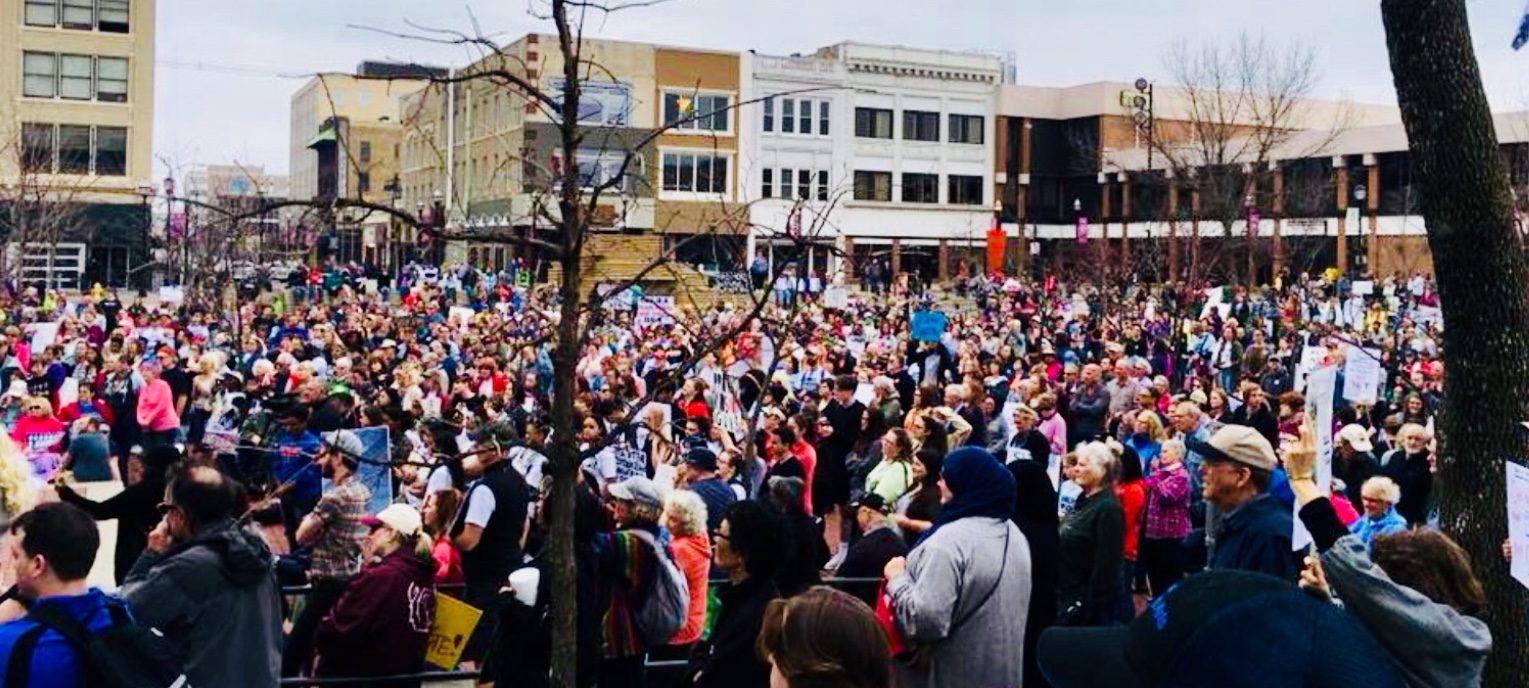
November 20, 2016
“Of Gods and Men”
Luke 23:33-43
One of the more obvious questions for us to ask on Reign of Christ Sunday, traditionally referred to as Christ the King Sunday (the last Sunday of the church year before Advent begins) is simply this: Why in the world did the church choose to pair a reading about Christ’s crucifixion with an understanding of Christ as King? I mean, wouldn’t it make more sense to assign a biblical passage that has to do with the triumphant Christ, riding in on a white horse, all-powerful and almighty? Why a passage that focuses on Jesus’ vulnerability and humiliation? What is kingly about that? It flies in the face of what we are conditioned to believe true kingship, or leadership, is all about.
Of course, that is the point: the way we understand leadership is often times a far cry from the way that Jesus understood leadership. One biblical scholar says that in this passage, Jesus asks the people,
“What kind of king do you want?” And the people reply that they want a different kind of king, one who is powerful, one who can save himself and others, one who can take vengeance on his and their enemies.
He goes on to wonder if Jesus’ question to us today is different? If not, “What kind of king?” at least, “What kind of leader?” And he wonders if in the last two weeks we – at least we who live in the United States – offered an answer quite similar to the one given in Jesus’ day.
After all, Jesus refuses to come in power and dominance but instead appears in abject vulnerability. He does not vow retribution on even those who crucify him but instead offers forgiveness. He does not come down off his cross to prove his kingly status but instead remains on that instrument of torture and humiliation, as the representative of all who suffer unjustly.
Jesus challenges all of our assumptions about what true kingship, what true leadership, looks like.
I’m reminded of the kind of leadership that we venerate today –> not the kind of leadership that we vote for, but that we venerate. We venerate the leadership of people like Martin Luther King Jr., Desmond Tutu, Malala Yousafzai and the Dalai Lama precisely because they model a more beautiful way of leading – they refuse to lead by dominance and coercion, but by love and vulnerability. And there’s a big difference between voting for a certain kind of leadership, and venerating a certain kind of leadership.
Over the last couple of weeks I’ve gone back to some of the writings that most influenced my faith; trying to make sense of where our world is, and how we can meaningfully act in it. I’ve also thought a lot about the Thanksgiving Day tables we’ll encounter this week, and how there will be many different perspectives shared by people gathered around the same table, and in the midst of all of this I wonder how we can meaningfully work toward reconciliation and unity in our relationships without losing sight of justice, for justice should never be sacrificed on the altar of unity (after all, if the world is not fair or just, then unity is impossible –> unity and reconciliation are possible because of justice, not the other way around).
And I’ve also felt very privileged thinking about all of this. I mean, as a straight cis white guy I may be wondering how we can face our families at the Thanksgiving Day table; yet all the while minorities, as well as many women, are wondering how they can exist in this nation. It’s one thing to be worried about your place around the table; it’s an entirely different thing to wonder about your place in the nation. To wonder if you have a place.
In 1967, following several major victories for the Civil Rights Movement in the United States, Martin Luther King acknowledged that we were still far from the promised land:
“I must confess, my friends, that the road ahead will not always be smooth. There will still be rocky places of frustration and meandering points of bewilderment. There will be inevitable setbacks here and there. And there will be those moments when the buoyancy of hope will be transformed into the fatigue of despair. Our dreams will sometimes be shattered and our ethereal hopes blasted.
We may again, with tear-drenched eyes, have to stand before the bier of some courageous civil rights worker whose life will be snuffed out by the dastardly acts of bloodthirsty mobs. But difficult and painful as it is, we must walk on in the days ahead with an audacious faith in the future. …Let us realize that the arc of the moral universe is long, but it bends toward justice.”
When talking about the way that the world turns toward justice, Dr. King wasn’t naïve or sentimental. He said that naïve and sentimental attitudes about the course of history stem:
“from a tragic misconception of time, from the strangely irrational notion that there is something in the very flow of time that will inevitably cure all ills. Actually, time itself is neutral; it can be used either destructively or constructively. More and more I feel that the people of ill will have used time much more effectively than have the people of good will. We will have to repent in this generation not merely for the hateful words and actions of the bad people but for the appalling silence of the good people. Human progress never rolls in on wheels of inevitability; it comes through the tireless efforts of men willing to be co workers with God, and without this hard work, time itself becomes an ally of the forces of social stagnation. We must use time creatively, in the knowledge that the time is always ripe to do right. Now is the time to make real the promise of democracy and transform our pending national elegy into a creative psalm of brotherhood. Now is the time to lift our national policy from the quicksand of racial injustice to the solid rock of human dignity.”
Now is the time.
Let me be abundantly clear. This sermon is not about a particular political candidate or a particular political win. This sermon is not about party loyalty. This sermon, this call for justice if you will, is about our responsibility to have our compass pointed true north, regardless of what country we live in or what political party or candidate we may or may not have supported. As Christians following the way of Jesus, a king who showed that true leadership has much more to do with love and vulnerability than dominance and coercion, we have the responsibility to point our compass true north, to the moral law, to God’s law, which is rooted in love and justice and transcends every political party and candidate and nation.
All of us as Americans have a shared responsibility, no matter who we voted for. I know a lot of people who voted for Trump, but it wasn’t because they supported oppression or discrimination. Yet regardless of any of our intentions, it’s all about outcome. Let’s hope the outcomes are good. But in the same way one has a Christian duty to criticize Obama for his drone policies, and his continued use of torture in Guantanamo Bay, so too do we have the responsibility to resist injustice anywhere we see it. Regardless of who you voted for, and regardless of your intentions when voting, if the outcome is oppression then you have a Christian duty to resist it. Time is not neutral; You have a responsibility to shape the moral arc of the universe.
In a letter to Christians who voted for Donald Trump, Geoff Holsclaw writes the following:
I believe you are doing your best. I believe you want good for America.
As a fellow evangelical, a local church pastor, and a seminary professor, I believe you want to be true to the gospel — to the “good news.”
In supporting Trump, I believe you did what you thought to be right by trying to vote for the lesser evil.
I believe you are not a racist, a misogynist, or a white nationalist because you voted for him. I believe you try to love your non-white neighbors, your Muslim coworkers, and your gay family members. I know you feel marginalized and shamed for your values.
As Christians, we seek to follow Jesus, who was a blue-collar worker living far from a corrupt cultural center, and he was pushed aside by those in power. I believe you see your vote for Trump as a call for another way, even if it was a vote for the lesser evil.
I believe you.
But a spike in hate crimes and harassment since the election reveals the consequences of voting for the lesser evil.
The empowerment of hatred because of Trump is now being felt across America: A woman was groped in the aisle of a grocery store in Grand Rapids, Mich., Swastikas and Trump’s name were spray-painted on windows in Philadelphia; a Chinese American woman said she was harassed by a white man in Minneapolis and told to “Go Back to Asia.”
Trump was elected with the support of four out of five evangelicals — people of the “good news.” But countless stories since his election show that, for people of color, women, and Muslims, his election has been very bad news.
I believe enabling this hatred was not your desire. You were just voting for the lesser evil.But if you do not confront racism, misogyny, and Islamophobia wherever you see it, then your vote for the lesser evil will become a vote for hate.
If you do not press for justice against hate crimes in your neighborhoods, then your vote for the lesser evil will become a vote for the oppression of people of color.If you do not make your churches a place of respect for women, then your vote for the lesser evil will become a vote for sexism.
If you do not live in a way that proclaims the dignity of all people made in the image of God, then your vote for the lesser evil will become a vote for bigotry and xenophobia.
You voted for Trump on Nov. 8. How will you vote today and every day moving forward?
Will you vote daily against racism at work through your hiring practices and your conversations over coffee?
Will you vote daily against sexism in the respect you show to women and the messages you send your children?
Will you vote daily against bullying by calling attention to cruelty when you see it and by overcoming your discomfort in the presence of a gay person?
These votes are being tallied every day. What will they reveal?
Time is not neutral; The moral arc of the universe, the moral law, God’s law, still calls. And we must respond.
